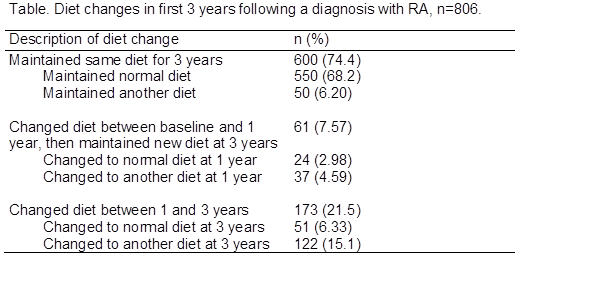Session Information
Session Type: ACR Poster Session A
Session Time: 9:00AM-11:00AM
Background/Purpose:
Major dietary modification and omega-3 supplements are often promoted on patient counseling websites for those with RA. Given uncertainty regarding such approaches, we aim to study the frequency and characteristics of patients who undertake these complementary measures.
Methods:
Included were 810 participants in the Epidemiological Investigation of Rheumatoid Arthritis (EIRA) in Sweden who answered questionnaires including diet (normal/Mediterranean/vegetarian/vegan/low glycemic index/other) and omega-3 supplement use at diagnosis, 1 year, and 3 years post-diagnosis. Prevalence of diet changes and supplement use were assessed. Logistic regression was used to analyze associations between changing diet post-diagnosis, omega-3 supplement use, and the lifestyle/demographic characteristics of education, sex, age, BMI, smoking, and pre-diagnosis diet.
Results:
Between 1999 and 2016, 810 EIRA participants (women: 74%, median age at inclusion: 58 (min 17-max 85), median BMI at inclusion 25.1 (min 15.5-max 50.1), university degree holders: 30%). The proportion of participants with a non-normal diet increased from 23% in 2008 to 30% in 2013. 26% reported a major change in diet within 3 years post-diagnosis (Table). Those who made a change were more likely to be younger (OR 0.98 per year of age, 95% CI 0.96-0.99), have a university education (OR 1.89, 95% CI1.28-2.80), be women (OR 1.77, 95% CI 1.28-2.80), be obese (OR 2.28, 95% CI 1.38-3.78), and have an non-normal diet at baseline (OR 2.81, 95% CI 1.36-5.79 for vegetarian; OR 10.12, 95% CI 5.79-17.71 for Mediterranean; OR 24.82, 95% CI 8.09-76.1 for others). Omega-3 supplement use increased from 20.4% at baseline to 30.9% at one year and decreased to 11.9% three years post-diagnosis. Participants were more likely to both change diets and use omega-3 supplements if they were younger (OR 0.98 per year increase, 95% CI 0.96-0.99), following an alternative diet at baseline (12.0, 95% CI 6.61-21.6), or obese (OR 2.05, 95% CI 1.09-3.88).
Conclusion:
Many RA patients change their diets or use supplements after diagnosis. To better target messaging about these complementary therapies, it may be beneficial to consider them by the sociodemographic and lifestyle characteristics that distinguish them.
To cite this abstract in AMA style:
Lancelot M, Grimaud O, Saevarsdottir S, Askling J, Klareskog L, Alfredsson L, Bengtsson C. Diet Change and Omega-3 Supplementation in the First Three Years Following a Diagnosis with Rheumatoid Arthritis in Sweden [abstract]. Arthritis Rheumatol. 2017; 69 (suppl 10). https://acrabstracts.org/abstract/diet-change-and-omega-3-supplementation-in-the-first-three-years-following-a-diagnosis-with-rheumatoid-arthritis-in-sweden/. Accessed .« Back to 2017 ACR/ARHP Annual Meeting
ACR Meeting Abstracts - https://acrabstracts.org/abstract/diet-change-and-omega-3-supplementation-in-the-first-three-years-following-a-diagnosis-with-rheumatoid-arthritis-in-sweden/

